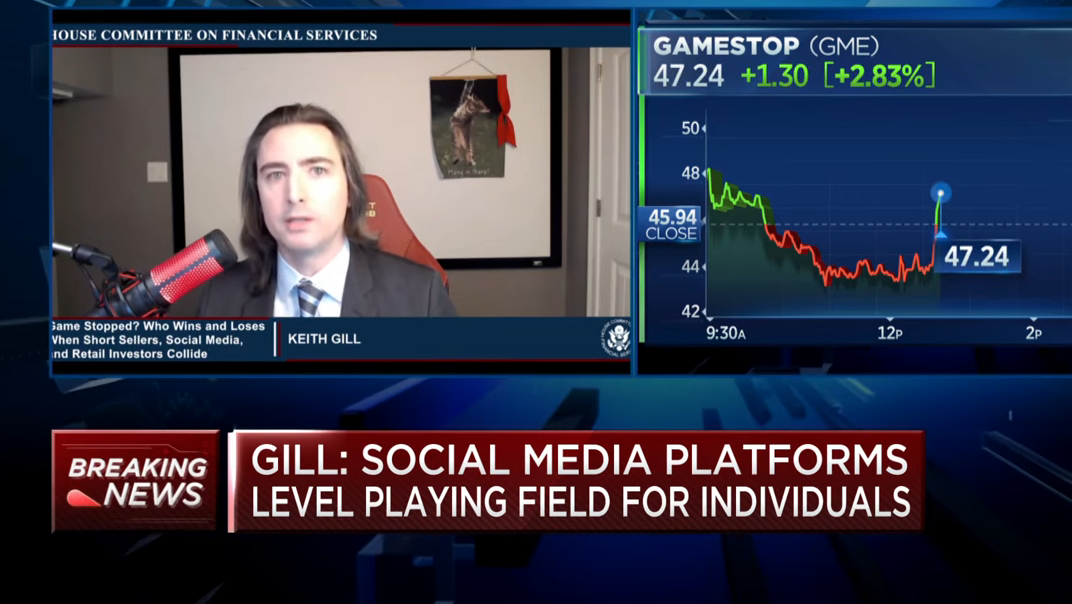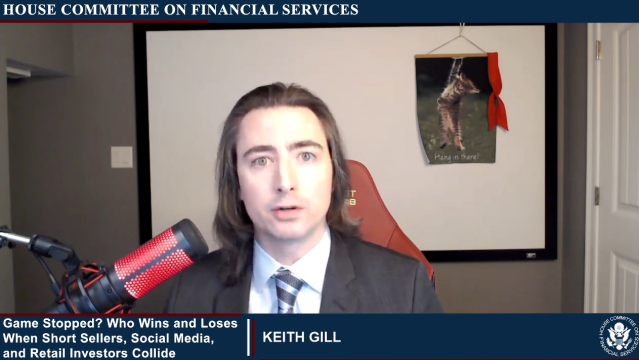History was made today when Reddit user DeepFuckingValue, who goes by Roaring Kitty on YouTube, opened his Congressional testimony in a hearing about GameStop stock by specifying, for the literal record, that he is not actually a cat.
“A few things I am not,” the meme stock icon, whose real name is Keith Gill, said in his opening statement before the House Committee on Financial Services. “I’m not a cat. I’m not an institutional investor, nor am I a hedge fund.”
He went on to explain his blue collar family upbringing, how he first became interested in stock market investment, and why he came to bet big on GameStop, a decision that ended up making him a multi-millionaire.
He was emphatically ernest, but that only made it all the more absurd as he sat there in what appeared to be a Secret Labs Omega gaming chair in front of a whiteboard with a small printed out picture of a kitten saying “hang in there” on it as if he was speaking from his middle school computer lab.
[referenced id=”1205501″ url=”https://www.kotaku.com.au/2021/02/even-the-justice-department-is-looking-into-the-gamestop-stock-fiasco/” thumb=”https://www.gizmodo.com.au/wp-content/uploads/sites/3/2021/02/13/jz6c45ntpvldggcvyxqv-300×169.png” title=”Even The U.S. Justice Department Is Looking Into The GameStop Stock Fiasco” excerpt=”While the dust starts to settle around GameStop’s meme stock phenomenon, investigations into the hedge funds, trading platforms, and the Reddit community that fuelled it are just getting started. Many people have already lost a lot of money, but even more could be on the line if lawmakers and regulatory…”]
“I grew up playing video games and shopping at GameStop, and I plan to continue shopping there,” he told committee chairwoman Rep. Maxine Waters and the other representatives in what will be the first of three Congressional hearings on the recent trading frenzy around GameStop and other meme stocks. “GameStop stores still provide real value to consumers and reliable revenue to GameStop.”
Over an hour into the hearing Gill, who just this week was accused in class-action lawsuit of market manipulation, was asked if he would still invest in GameStop stock even today as it hovers around $US45 ($58) a share, still double what it was even two months ago. “Let me just say that investing can be risky and my particular approach to investing is rather aggressive and may not be suitable for anyone else, but for me personally, yes,” he said. “I do find it’s an attractive investment at this price point.”
The chat for the CNBC YouTube livestream of the proceedings momentarily went wild.

To recap: Gill and others began making the case on the WallStreetBets subreddit for GameStop’s stock, which had been in the tank since the rise of digital game sales starting in mid-2019. Other observers began to notice that GameStop stock was massively shorted by some big hedge funds. This would go on to create a feedback loop by which investors, including amatuer traders on commission-free platforms like Robinhood, could propel the price upward simply by purchasing more and more of it.
These market dynamics, combined with hype on WallStreetBets, the ease of making trades on your phone, and moves by big institutional investors, eventually turned GameStop into a meme stock bubble that peaked at over $US450 ($581) in late January before plummeting back down to earth in early February. Things got so wild that Robinhood temporarily banned users from buying more GameStop sharesat one point, blaming capital requirements regulated by the government. Some people made a lot of money, others lost a lot, and now some of the main actors have been hauled in front of Congress to try and make sense of it all.
In addition to Gill, Melvin Capital CEO Gabriel Plotkin, Citadel CEO Kenneth Griffin, Reddit CEO and co-founder Steve Huffman, and Robinhood CEO Vlad Tenev were also present. The committee spent most of its time ignoring Reddit and Melvin, the fund that lost billions shorting companies like GameStop, and instead grilled Tenev (on whether his platform is predatory) and Griffin (on whether his firm, a market maker which executes a large number of the trades made on Robinhood, is ripping off those customers).
Meme stock boosters are still pissed at Robinhood for locking them out of buying during crucial moments of market volatility, but the bigger concern for the average person is how the platform attracts users by gamifying the stock market and then sells the information about their tradesto firms like Capital Securities. As the one executing the commission-free trades, Capital Securities can make money off of trades by executing at the right time (high frequency trading) and making a tiny margin on what’s called the “order flow.”
[referenced id=”1203544″ url=”https://www.kotaku.com.au/2021/02/gamestops-stock-cant-save-you/” thumb=”https://www.gizmodo.com.au/wp-content/uploads/sites/3/2021/02/02/u3ykv5nbsbc8logh8bgx-300×169.jpg” title=”GameStop’s Stock Can’t Save You” excerpt=”GameStop’s rollercoaster ride through the absurd machinery of the stock market has been fun to watch. It sent some of CNBC’s finest minds scrambling to Wikipedia to find out what Reddit is and allowed for Very Serious Thought Leaders to peddle all sorts of pet theories, like blaming GameStop’s unlikely…”]
Firms like Citadel Securities have a fiduciary obligation to get the best deal possible for their customers’ trades, but whether that’s actually happening is in dispute. Citadel says it does and complies with all of the relevant laws, as does Robinhood, but the conflicts of interest are clear for everyone to see. Just last year Robinhood paid the SEC over $US60 ($78) million in fines for duping investors.
“When you’re not paying for it, it’s not free,” said Rep. Brad Sherman at one point.
Meanwhile Robinhood, like many startups, has found a market niche it can profit off of without offering those customers a modicum of protection. The company is currently being sued by the parents of a 20-year old who took his own life last year after a glitch on the app convinced him he owed hundreds of thousands he didn’t have. The young retail investor couldn’t reach anyone from Robinhood for an answer until after he was dead. Tenev admitted during today’s hearing that the company, which just received an additional $US1 ($1.3) billion in backing, is still working on building up its customer service call centres.
For his part, Gill said he’s not sure if any new legislation should come out of the hearing, but he did call for more transparency in the market, including from players like Robinhood and Citadel. The GameStop situation, which in many ways has never actually been about GameStop, has momentarily shed a public light on these larger questions. Who knows what Congress or regulatory agencies like the SEC will do with the answers if and when they find them.

Leave a Reply